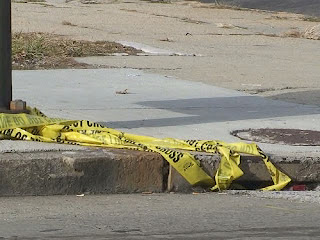
Call it the Case of the Bloody Mattress.
City sanitation workers in southwestern Kentucky were recently left with the problem of how to dispose of a bloody mattress put out with the trash.
The mattress came from a home where police say a 37-year-old man appears to have died from self-inflicted stab wounds. The problem came when trash collectors realized they couldn't pick up a potential biohazard, but didn't want to leave it by the side of the road in a residential neighborhood in Hopkinsville.
"This was an area of concern for us because blood is considered a biohazard and not only can our trash trucks not pick it up, but it could be dangerous for people in the community," said George Hampton, a route supervisor for Hopkinsville Solid Waste Authority.
The Kentucky New Era reports that the mattress disappeared by midweek, but sanitation officials didn't take it and were still trying to make sure it was properly disposed of. The location of the mattress remained a mystery at week's end.
Hopkinsville sanitation workers received an anonymous call reporting a mattress, possibly covered in blood, that had been set on a curb outside of a home. That was the concern of the anonymous caller, Hampton said, who said children in the neighborhood could start to play on the mattress and come into contact with the dried blood that might have diseases.
Because there was blood on the mattress, sanitation workers couldn't haul it off with the rest of the trash.
"It raises a question for us about where we take it from here," Hampton said. "Someone has to clean up messes like these and we can't do it."
Solid Waste Superintendent Bill Bailey said sanitation workers aren't allowed to pick up possible biohazards, including blood, from the side of the road. Instead, Bailey said, the department needs to call other landfills to see who will pick up and take the items.
"Sometimes we can process and wrap it in plastic and dispose of it that way. But other times we have to contact a company that deals with disposing of medical waste."
Charlotte Write, a spokeswoman for Stericycle, a national company that specializes in medical waste disposal, said medical waste is generally burned to kill pathogens that can live in dried blood.
"It is important to dispose of all medical waste, especially waste that comes from the body, so as not to spread diseases," Write said.
Hopkinsville Police Chief Guy Howie said the families must clean up the scene of a murder or suicide or pay to have it done.
"It doesn't sound very friendly, I know, but that's just how it has to be handled," Howie said. "Someone has to clean it up and someone has to dispose of all of this, it's just a matter of figuring out who. It's amazing that just one mattress on a curb can raise so many questions."
Someone solved sanitation's problem by taking the mattress from in front of the home. Bailey said sanitation workers didn't remove it, but finding out what became of the mattress is important. It had to be properly sterilized and disposed of.
"We can't just stick it in our landfill and be done with it," Bailey said. "Whether it's on that curb or not, it's still hazardous material."

